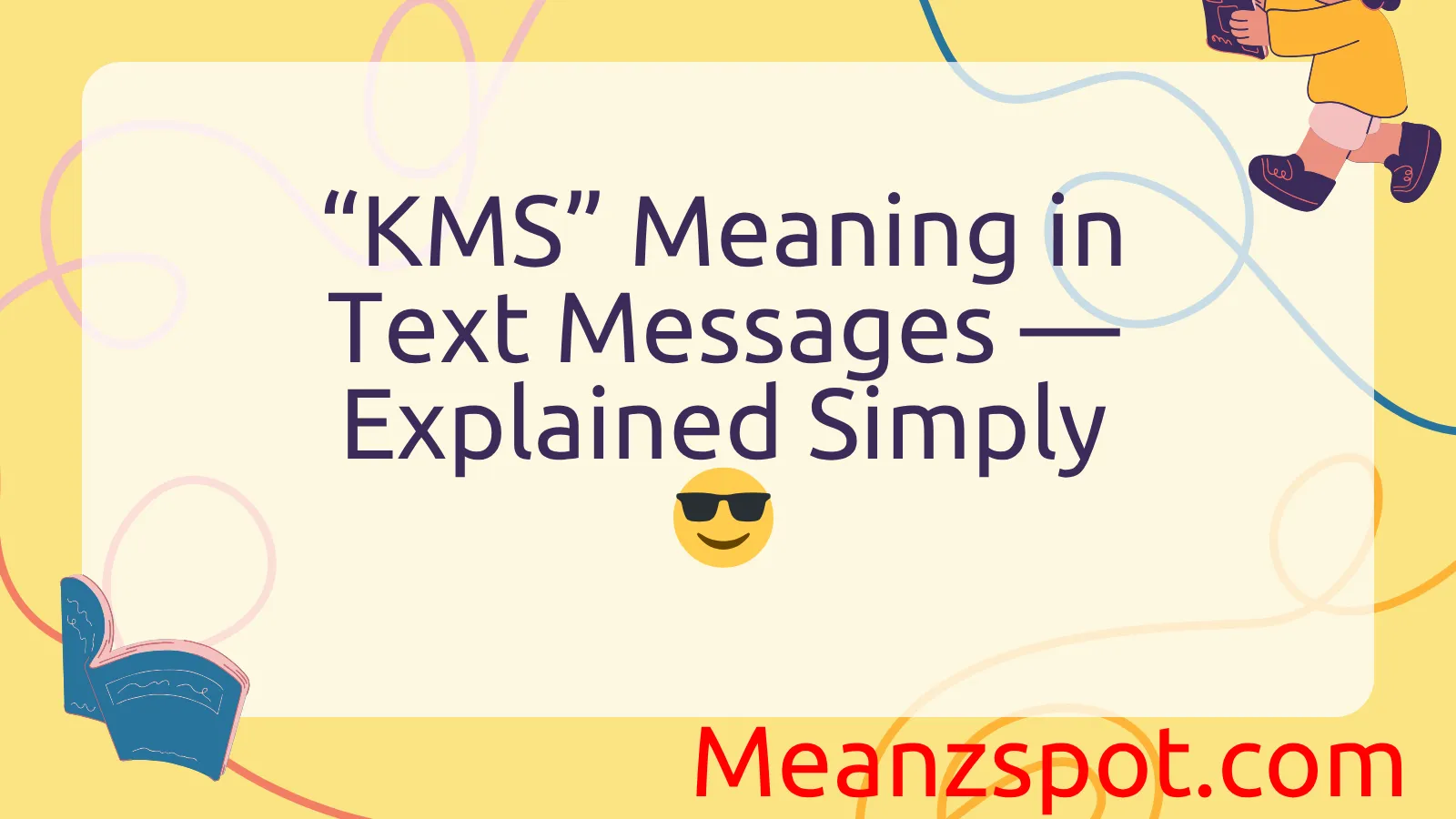Ever seen someone text “KMS” and felt confused about what they really mean? 😎 You’re not the only one! In today’s world of fast texting and internet slang, “KMS” can carry different meanings based on tone, context, and who’s saying it.
Most of the time, “KMS” stands for “Kill Myself”, but don’t panic — it’s usually not meant literally. It’s often used as a dramatic or humorous exaggeration, like when someone says, “Ugh, I have to work on a Sunday… KMS 😩.” It’s a way of expressing frustration, stress, or exhaustion in a lighthearted tone.
However, it’s important to note that context matters a lot. Sometimes “KMS” can be used in a serious or emotional sense, and recognizing the difference is key. 💬 In this guide, we’ll break down what “KMS” means in text, when it’s just a joke, when it’s not, and how to respond appropriately — all with the updated 2025 slang meaning you need to know. ✨
Definitions & Meaning
KMS is an acronym that stands for different things depending on the context, but the most common meanings are:
- Kill Myself
- Kill Me Softly (less common)
- Kilometers (in more technical or geographical contexts)
Kill Myself
In texting and online chats, KMS is often shorthand for “kill myself.” It’s used informally to express extreme frustration, embarrassment, or exasperation, similar to saying “I’m so done” or “This is unbearable.” For example, if someone makes a silly mistake, they might text “KMS” to exaggerate their reaction humorously.
Kill Me Softly
Less commonly, KMS can refer to the phrase “kill me softly,” which is derived from the famous song title. This usage is generally less frequent and more poetic or artistic.
Kilometers
In scientific, travel, or measurement discussions, KMS might simply be an abbreviation for kilometers, the metric unit of distance. This usage is straightforward and entirely different from the emotional or slang meanings.
Origins & History
The use of KMS as an acronym primarily emerged with the rise of online chat platforms, instant messaging, and social media. As texting grew popular in the early 2000s, people began shortening common phrases to save time and characters, especially with character-limited platforms like Twitter or SMS.
The phrase “kill myself” has been part of youth slang for decades, often used hyperbolically to express feelings of embarrassment or defeat. The acronym KMS likely started appearing in internet forums and texting communities around the mid-2000s as shorthand for this expression.
The kilometers abbreviation is much older and comes from the scientific and measurement field. It’s commonly used in geography, travel, and maps and predates internet slang.
Over time, KMS has been adopted in memes, pop culture references, and casual conversation, often losing its more serious connotation and being used more playfully.
Usage in Different Contexts
Social Media & Texting
On platforms like Twitter, Instagram, TikTok, and in texting apps, KMS is mostly used casually. For example:
- “I just failed my exam, KMS 😂” — Here, the user exaggerates their frustration but doesn’t literally mean anything harmful.
- “That awkward moment when you wave at someone who wasn’t waving at you… KMS”
It’s important to note that while many use KMS jokingly, some people might take it seriously or find it concerning, especially when talking about mental health.
Professional Settings
In professional or formal communication, KMS is generally avoided due to its slang nature and potentially sensitive meaning. Using it could be seen as unprofessional or confusing.
Pop Culture
In memes and pop culture, KMS is often part of a joke or exaggeration. Some influencers or online personalities use it in captions or comments to dramatize their feelings about trivial problems.
Geographic & Technical
When talking about distances or routes, KMS is simply an abbreviation for kilometers. For example:
- “The race is 10 KMS long.”
- “We traveled 300 KMS yesterday.”
Common Misunderstandings & Clarifications
Because KMS can mean vastly different things, it’s easy to misunderstand it:
- Not Always Literal: When someone says “KMS” in a joking way, they usually don’t mean it literally. It’s a form of exaggeration to express frustration or embarrassment.
- Mental Health Sensitivity: Some people might interpret KMS as a sign of suicidal thoughts. It’s essential to approach such messages with care and check in with the person if you’re concerned.
- Kilometers Confusion: If you see KMS in a technical or geographic context, don’t confuse it with the slang version. It simply means kilometers.
- Avoid in Professional Contexts: Using KMS in work emails or formal communication can be seen as inappropriate or unclear.
Alternatives & Synonyms
If you want to express frustration or embarrassment without using KMS, here are some alternatives:
- FML (F*** My Life) — Another popular slang for expressing frustration.
- SMH (Shaking My Head) — Expressing disbelief or disappointment.
- Facepalm — A gesture or word used to show embarrassment.
- LOL (Laugh Out Loud) — To lighten the mood after a mistake.
- Sigh — A simple way to show exasperation.
For professional contexts, it’s best to use clear, respectful language like “This is frustrating” or “I’m very disappointed.”
Frequently Asked Questions (FAQ)
1. Is KMS a serious expression of suicidal thoughts?
Not always. Many people use it jokingly or hyperbolically to express frustration. However, if someone uses it seriously, it’s important to take their feelings seriously and offer support.
2. Can KMS be misunderstood?
Yes. Without context, KMS can be misinterpreted as a literal threat or just slang. Always consider the conversation tone and relationship.
3. Is it appropriate to use KMS in professional emails?
No. It’s informal slang and may be considered unprofessional or confusing.
4. What does KMS mean in travel or geography?
It means kilometers — a unit of measurement for distance.
5. Are there safer ways to express frustration online?
Yes. Use alternatives like FML, SMH, or simply describe your feelings in words.
6. Can using KMS be offensive?
Potentially. Since it references self-harm, some people may find it insensitive, so use it cautiously.
7. How should I respond if someone texts me KMS seriously?
Reach out with care, ask if they’re okay, and encourage them to talk to someone they trust or a professional.
Conclusion
Understanding the meaning of KMS is essential in today’s fast-paced digital conversations. While it commonly stands for “kill myself” and is often used jokingly to express frustration or embarrassment, it can also carry serious connotations and should be used thoughtfully. Additionally, KMS can simply mean kilometers in technical contexts.
Being aware of these meanings helps prevent misunderstandings and ensures respectful communication, especially in sensitive situations. When in doubt, it’s better to choose clear language and be mindful of others’ feelings. Communication is key, and knowing the nuances of acronyms like KMS helps us connect better in both casual and formal conversations.



